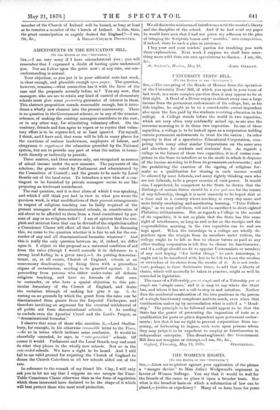AMENDMENTS IN THE EDUCATION BILL
(TO THE EDITOR OF THE .` SPECTATOR:I
am very sorry if I have misunderstood you ; you will remember that I expressed a doubt of having quite understood you. Nor am I clear upon the point now ; at any rate, our mis- understanding is mutual.
Your objection, as you put it in your editorial note last week, is clear enough, and plausible enough upon paper. The question, however, remains,—what connection has it with the facts of the case and the proposals actually before us ? You say now, that managers who are are to retain any kind of control of elementary schools must give some pecuniary guarantee of interest in them. This abstract proposition sounds reasonable enough, but it intro- duces a wholly new element into the present controversy. There is no question in the Government scheme, or in any of the counter- schemes, of making the existing managers contribute to the cost ; or in any other way, for stimulating voluntary effort. On the contrary, friends and foes agree to regret or to rejoice that volun- tary effort is to be superseded, or at least ignored. For myself, I think, and I have said, that room will be left in many places for the exertions of zealous landowners, employers of labour, and clergymen to supplement the education provided by the National system, but not to provide any part of what the nation is hence- forth directly or indirectly to provide.
Three sources, and three sources only, are recognized as sources of school income under the new measure. The payments of the scholars; the grants voted by Parliament and administered by the Committee of Council ; and the grants to be made by Local Boards out of the local rates. To introduce a new idea of a con- tingent to be furnished by private managers seems to me like proposing an irrelevant amendment.
The real question, and it is that alone of which I was speaking, and which I still think you had in view in what you wrote the previous week, is what modifications of their present arrangements in respect of religious teaching can be fairly required of the present managers of denominational schools, in consideration of aid about to be afforded to them from a fund contributed by per- sons of any or no religious belief? I am of opinion that the sim- plest and strictest form that can be devised of the stipulation called a Conscience Clause' will effect all that is desired. In discussing this, we come to the question whether it is fair to ask for the sur- render of any and all denominational formulas whatever ? And this is really the only question between us, if, indeed, we differ upon it. I object to the proposal as a universal condition of aid from the rates (though I would concede it in deference to a strong local feeling in a given case),-1. As putting denomina- tional, or, at all events, Church of England, schools at an unnecessary disadvantage, by fixing them with a groundless stigma of sectarianism, needing to be guarded against. 2. As proceeding from persons who either under-value all definite religious teaching, and have no formula of their own to surrender, or who have a special objection to this par- ticular formulary of the Church of England, and desire the sectarian triumph of making her give it up. :3. As resting on no grounds by which the grant from the rates can be discriminated from grants from the Imperial Exchequer, and therefore involving an argument for the eventual withdrawal of all public aid from denominational schools. 4. As tending to exclude even the Apostles' Creed and the Lord's Prayer, as "denominational formulas."
I observe that some of those who sanction it,—Lord Shaftes- bury, for example, in his otherwise reasonable letter to the Times, —do so in terms which indicate some confusion. It would be cheerfully conceded, he says, in "rate-provided" schools. Of course it would. Parliament and the Local Boards may and must do what they please in the wholly new schools. Not so in the rate-aided schools. We have a right to be heard. And I still fail to see valid ground for requiring the Church of England to disuse the Church Catechism in all her schools aided out of the rate.
In reference to the remark of my friend Mr. Clay, I will only ask you to let me say that I suppose no one accepts the Time- Table Conscience Clause otherwise than as the form of regulation which those interested have declared to be the shape of it which will best protect those who most need protection. We all desire the mini muin of interference with the master's liberty and the discipline of the school. And if he had read my paper he would have seen that I had not given my adhesion to the plan of bringing the Scripture lesson and " marbles "into competition, if indeed, there be such a plan in existence.
I beg your and your readers' pardon for troubling you with these explanations. Next week I suppose we shall have some- thing more solid than our own speculations to discuss.—I am, Sir, &c.,






























 Previous page
Previous page